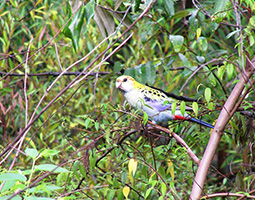Platycercus adscitus
Description
This medium-sized parrot, found in woodlands, open forests, cultivated lands and urban areas of north-eastern and eastern Australia, is very well camouflaged despite its varied colours. It sports a yellow and black back, blue underparts and red rump, pale blue-white bill and dark grey legs. The predominantly white cheeks and pale yellow head give rise to its name. Males and females are similar, with an off-white underwing stripe, slightly duller colours and smaller size distinguishing the female from the male.
found in woodlands, open forests, cultivated lands and urban areas of north-eastern and eastern Australia, is very well camouflaged despite its varied colours. It sports a yellow and black back, blue underparts and red rump, pale blue-white bill and dark grey legs. The predominantly white cheeks and pale yellow head give rise to its name. Males and females are similar, with an off-white underwing stripe, slightly duller colours and smaller size distinguishing the female from the male.
Like many other parrots, the Pale-headed rosella is noisy, with a shrill 'trin-see, trin-see' call, 'kwik, kwik' while flying, high-pitched rapid 'pi pi pi pi pi' or soft chattering.
Pale-headed rosellas nest in large tree hollows at least a metre deep, or hollow stumps or posts, usually near water, anywhere from September to June depending on their locality. They lay a clutch of 5 or 6 (up to 9) shiny, round, white eggs on a layer of wood dust. After incubation, which the female does alone, the male then returns to help feed the young.
Adaptations
Feeding relationships
- What I eat: seeds and fruits of grasses, shrubs and trees, including eucalyptus, casuarina and melaleuca varieties; flowers, insects and insect larvae
- What eats me: hawks, kites, quolls, feral and domestic cats
Interesting facts
The very similar Eastern Rosella, Platycercus eximius, which has a bright red rather than yellow head is often found with the Pale-headed rosella where their ranges meet and they are known to breed together creating blended characteristics.
Source: Atlas of Living Australia, Australian Museum, iNaturalist